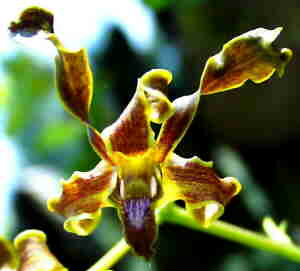|
|
|
CONTACT US
Click Here! |
| This site is best viewed with a screen resolution of 800 X 600 at high colour settings |
|
Flask list
Acacallis-Ancistrochilus Angraecum-Aspasia Barkeria-Broughtonia Bulbophyllum Capanemia-Catasetum Cattleya Cattleyopsis-Cycnoch, Cymbidium-Cyrtorchis Dendrobium-Dossinia Encyclia-Eulophiella Galeandra-Kalopternix Laelia-Lycaste Macodes-Nephalaphyll, Odontogloss,-Oncidium Paphiopedilum-Psychilis Rangaeris-Stenocoryne Tainia-Zygopetalum |
|
Plant list
Acampe-Bulbophyllum Cattleya-Dossinia Encyclia-Promeaea Renanthera-Vanda |

|
IMPORTANT NOTE. click here for NEW PHYTOSANITARY Certificate news, EXDOC. IMPORTANT NOTE click here for USA importers. Phytos & Permits. In FLASK.
Dendrobium Ceretobe species New Guinea.Photo right. In PLANTS.
Ascocentrum curvifolium, Trichoglottis loheriana,
Trichoglottis latisepala.
Ready
to replate. Cattleya
schilleriana "coerulea", Phalaenopsis schilleriana, Stanhopea candida,
Sarcochilus cecileae "Cleveland Bay", Sarcochilus roseus.
Culture.
Conservation by Seed. Pollination.
Highlighted species are links to photos/articles.. 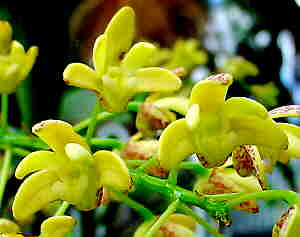 Dendrobiums
are robust species, and will develop into a large plant with adequate
fertiliser and water when in growth. A large pot or basket in a rich media
that drains well, a drier winter, and protection from cold are required. Dendrobiums
are robust species, and will develop into a large plant with adequate
fertiliser and water when in growth. A large pot or basket in a rich media
that drains well, a drier winter, and protection from cold are required.
Dendrobium gracilicaule. Photo right.A plant of the edges of the rainforest. The tall gracefull canes bear clusters of yellow fragrant flowers. Best grown in a small well drained pot or basket, with plenty of sunlight and a drier rest in the cooler months. An endemic Australian species. Dendrobium teretifolium var fasciculatum.This species gets its name from the long terete pencil like leaf. The pendulous spike is plume like, with white flowers, purple stripes in the labellum, and is highly fragrant. Dendrobium teretifolium is best grown on a treefern slab or small basket, with maximum sunlight and must have good drainage. The plant creeps and is pendulous. A native of eastern Queensland, the northern variety fasciculatum is somewhat larger. 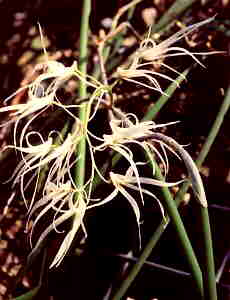
Oncidium splendidum. Tall spikes of large golden yellow flowers.This is a semiterestrial species from Honduras. 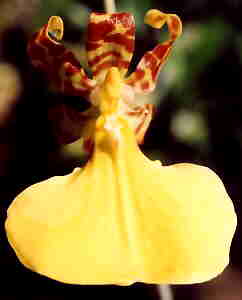
It requires a well drained media, a pot or large treefern mount, with lots of water when in active growth and a dry rest when not. The flowers are spectacular and produced on tall spikes. Warm to intermediate grower. Top New in Plants. 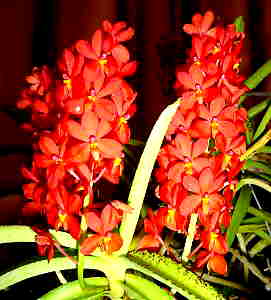 Ascocentrum curvifolium from
Thailand produces brilliant orange red bottlebrushes. Flowering size plants
are currently potted in basket pots.A bright sunny position, good drainage
and warm conditions required.
Ascocentrum curvifolium from
Thailand produces brilliant orange red bottlebrushes. Flowering size plants
are currently potted in basket pots.A bright sunny position, good drainage
and warm conditions required.
.jpg) Trichoglottis loheriana from
the Philippines. Advanced seedlings are also growing in small basket pots.
This is a non climbing Trichoglottis, so a basket is ideal, with conditions
similar to the Ascocentrum curvifolium. A
most unusual colour combination of green and almost black.
Trichoglottis loheriana from
the Philippines. Advanced seedlings are also growing in small basket pots.
This is a non climbing Trichoglottis, so a basket is ideal, with conditions
similar to the Ascocentrum curvifolium. A
most unusual colour combination of green and almost black.
Trichoglottis latisepala also from the Philippines, is a pendulous species that does well on a slab. A small basket can also be used provided the media is open and well drained. It will grow happily alondg with the Ascocentrum. The pink flowers are produced along the leafy stem. 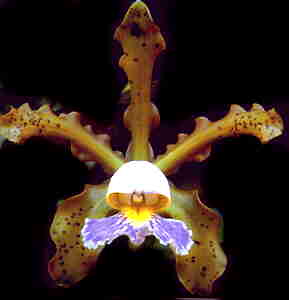 Ready
to Replate. Ready
to Replate.
Cattleya schilleriana "coerulea", A spectacular species, a bifoliate that requires a shallow pot or basket, or if available, the best media is a good slab of treefern fibre. A shade grower, it definitely rests in the cooler months and should be then kept on the dry side. When in active growth, plenty of water and fertiliser is of benefit, especially if grown on the treefern slab which tends to require more water. It is not a large grower, and like Cattleya aclandeae, it will climb up a mount. 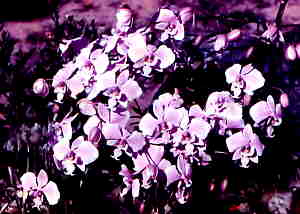 Phalaenopsis schilleriana, A Philippines species. Showy. A spectacular flowering species with mottled leaves of green with dark purple and masses of pink
flowers. Slotted pots or a basket, spaghnum moss works well for us. In
the cooler months, the plants need to be somewhat drier, but in the growing
season, lots of water and fertiliser. Phalaenopsis schilleriana, A Philippines species. Showy. A spectacular flowering species with mottled leaves of green with dark purple and masses of pink
flowers. Slotted pots or a basket, spaghnum moss works well for us. In
the cooler months, the plants need to be somewhat drier, but in the growing
season, lots of water and fertiliser.
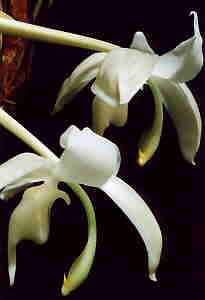 Stanhopea candida, a typical Central
American Stanhopea requiring a basket for the pendulous spike to emerge
from beneath the plant. A warm to intermediate grower, the media should
be damp but not wet, and fairly shady conditions are needed unless extra
fertiliser is applied with the extra sunlight. Stanhopeas are heavy feeders
and poor leaf condition may be an indication of insufficient nutrient for
the growing plant. Stanhopea candida, a typical Central
American Stanhopea requiring a basket for the pendulous spike to emerge
from beneath the plant. A warm to intermediate grower, the media should
be damp but not wet, and fairly shady conditions are needed unless extra
fertiliser is applied with the extra sunlight. Stanhopeas are heavy feeders
and poor leaf condition may be an indication of insufficient nutrient for
the growing plant.
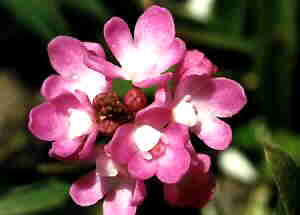 Sarcochilus
cecileae "Cleveland Bay" is a native of North Queensland, Australia.
It is a rock growing species in crevices on exposed rock faces, and thus
a very well drained media, a lot of sunlight and maximum air movement are
mandatory. A robust grower in a small basket or clay pot in pieces of rock
with a little leafmould. It the dry cool months, minimal water is needed
and the plants should be kept on the dry side. Sarcochilus
cecileae "Cleveland Bay" is a native of North Queensland, Australia.
It is a rock growing species in crevices on exposed rock faces, and thus
a very well drained media, a lot of sunlight and maximum air movement are
mandatory. A robust grower in a small basket or clay pot in pieces of rock
with a little leafmould. It the dry cool months, minimal water is needed
and the plants should be kept on the dry side.
Sarcochilus roseus, below, is closely related to S. cecileae and is grown in the same manner. It is also a rock grower, but grows on the edges of rain forest in North Queensland. Species highlighted are links to photos. 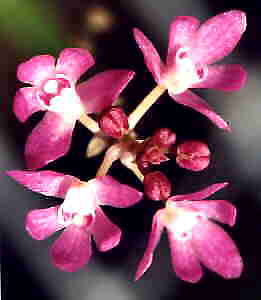
More photos at www.speciesorchids.com/photos.html This is particularly true of the more evolved species, the monopodial Vandaceous species. While selfings are sometimes the only choice, it is always better to use two clones, but a successful selfing will produce innumerable plants or clones. The pollin to removed from a bottom ( of the spike) flower and transferred to the stigma of a top ( of the spike) flower, leaving the pollin in the top flower. This is repeated so both plants bear a pod. Where a selfing occurs, it is best to pollinate a flower at both top and bottom of the spike. By leaving the pollin in the receptor flower, the flower lasts longer without wilting, as is the case if the pollin is removed. The pollination can also be repeated again after a few days. Usually the first pod will burst first, giving some warning that the next one is ready for harvesting. Dry seed; when the pod bursts or appears to be about to, the pod is removed and the seed shaken onto a sheet of clean note paper. The empty pod is discarded and should not be left with seed as the fleshy pod will rot. The note paper is then folded to form a packet, labelled with full name and date of collection. Green seed pod; This can be treated and the seed sown immediately by sterilising the pod in a chlorine or peroxide solution. The pod is opened in the clean work cabinet using scalpel or forceps and a very small portion of seed placed into the mother flask on the point of the scalpel or picked out with the forceps. Transfering green pods to other places is done by wrapping the pod in tissue paper, then in a paper or cardboard container. Green pods, and dry seed also, should never be placed in a sealed glass or plastic container or wrapped in plastic. Moisture from the green pod quickly turns it mouldy and destroys the seed. Similarly, there is often enough moisture in seed to cause mould development. To explain the position of the pollin and stigma, the central column of the flower has a pollin cap at the apex. Under this cap sits the pollin, usually two or four of them, in some orchids they are attached to little adhesive stipes. By gently lifting the pollin cap, the pollin can be removed with something like a tooth pick. The stigma is usually a small wet looking sticky patch on the underside of the column, below the pollin cap. Fragrance is a good indicator that the stigmatic surface will accept pollin. With some species, the stigmatic surface is hidden, and there is a small slit across the column where the pollin must be inserted, particularly in the genera such as Stanhopea, Gongora and their relatives. |
